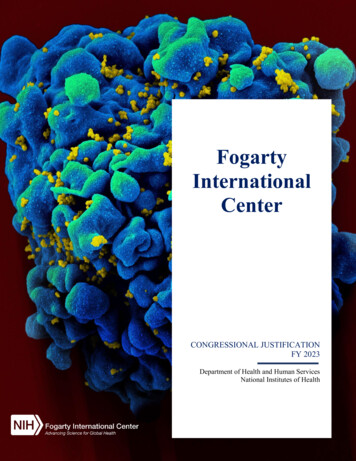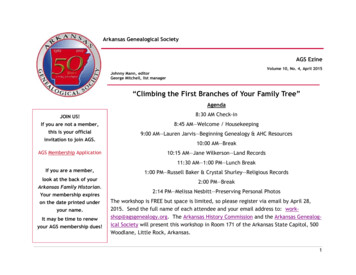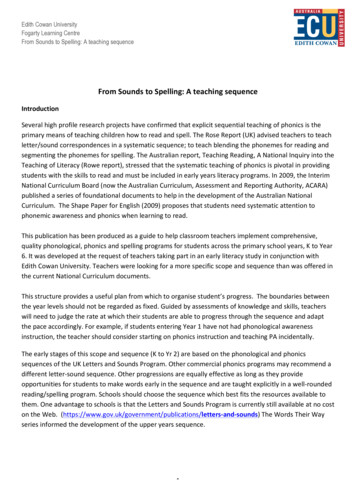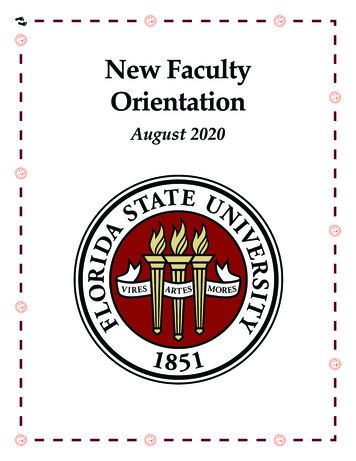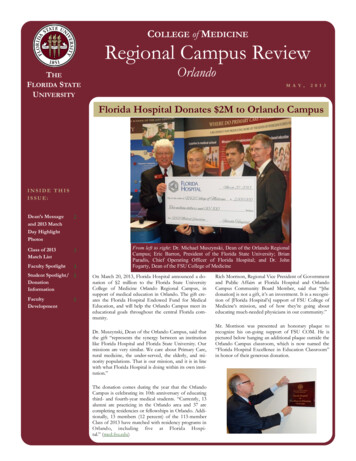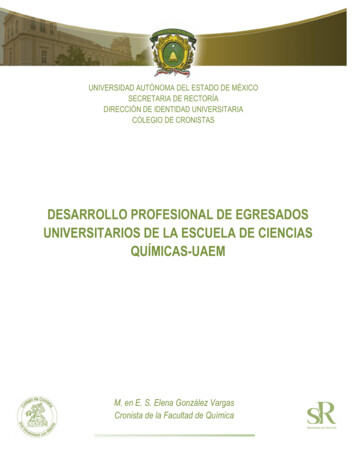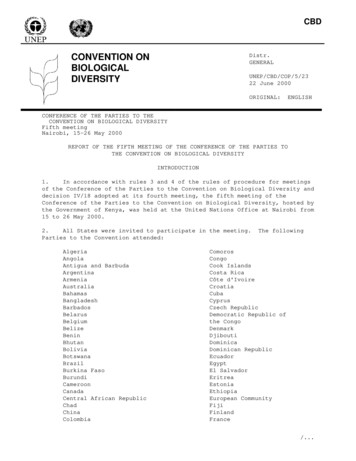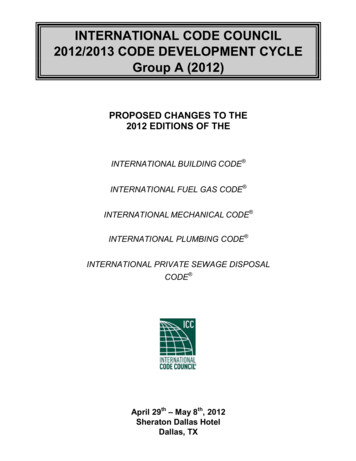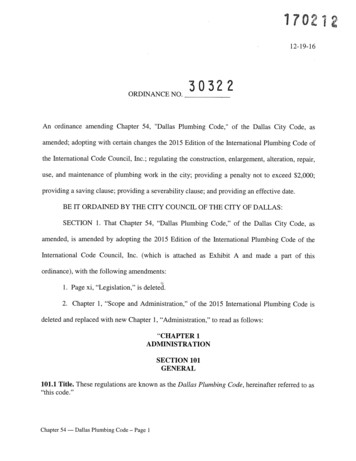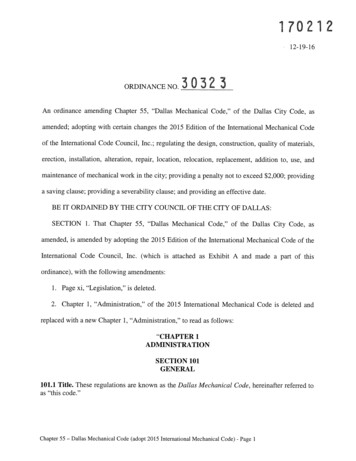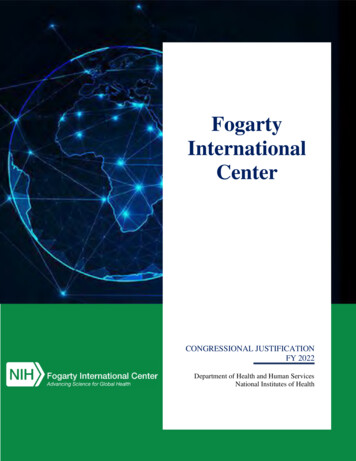
Transcription
FogartyInternationalCenterCONGRESSIONAL JUSTIFICATIONFY 2022Department of Health and Human ServicesNational Institutes of Health
DEPARTMENT OF HEALTH AND HUMAN SERVICESNATIONAL INSTITUTES OF HEALTHFogarty International Center (FIC)FY 2022 Budget Table of ContentsPage No.Director’s Overview.3IC Fact Sheet .9Major Changes in Budget Request . 11Budget Mechanism Table.12Appropriations Language .13Summary of Changes .14Budget Graphs .15Organization Chart .16Budget Authority by Activity .17Justification of Budget Request .18Program Descriptions.18Appropriations History .23Authorizing Legislation .24Amounts Available for Obligation .25Budget Authority by Object Class .26Salaries and Expenses .27Detail of Full-Time Equivalent Employment (FTE) .28Detail of Positions .29FIC-2
Director’s OverviewThe Fogarty International Center advances the mission of the NationalInstitutes of Health (NIH) by: (1) training the next generation ofscientists to address global health needs; (2) supporting globalhealth research conducted collaboratively by U.S. and internationalinvestigators; and (3) facilitating partnerships between health researchinstitutions in the United States and abroad. Since its establishmentmore than 50 years ago, Fogarty has identified scientific gaps andopportunities in global health and catalyzed science on cross-cuttingissues that complement and support the work of other NIH Institutes,Centers, and Offices. Fogarty serves as a focal point for global healthand international activities across NIH, helping advance global healthresearch agendas, develop trans-NIH cooperative activities with foreign Roger I. Glass, M.D., Ph.D.partners, and represent the NIH international research agenda within the Director of the FogartyInternational Center andU.S. Government and with foreign governments and organizations.Associate Director forInternational ResearchAs the COVID-19 pandemic demonstrates, diseases know no bordersand the health of Americans is intertwined with that of populationsaround the world. We must ensure that scientists worldwide areprepared to work together to combat existing and future threats that affect us all. Our programsstrengthen the scientific workforce and develop global research networks that can respondquickly to urgent, pressing health needs. For example, Fogarty support helps to equip scientistsin low- and middle-income countries (LMICs) with the necessary skills to study emerginginfectious diseases at their point of origin, helping prevent or limit their spread to other countries.Scientific breakthroughs from global health research also benefit Americans suffering fromthe same diseases or health conditions. Fogarty’s cross-cutting mission enables us to supportresearch and research training in LMICs that can improve health across different diseases,including HIV/AIDS, brain disorders, cancer, stroke, and cardiovascular disease. We invest inthe development of technologies to improve health in low-resource settings and support scientificapproaches to enable better translation of evidence into practice. We also develop scientificnetworks that tackle a wide range of communicable, non-communicable, and environmentalhealth threats.Fogarty investments also extend the reach and competitiveness of U.S. universities. Currently,Fogarty supports nearly 500 research and training projects involving more than 100 U.S.universities. Two-thirds of Fogarty grants are awarded to U.S. institutions, and nearly all Fogartyawards involve U.S. researchers. Through these awards, U.S. institutions partner with researchinstitutions in LMICs to build long-term relationships that provide scientific and trainingopportunities for both partners. Fogarty-facilitated collaboration with international researchershelps American scientists remain globally competitive and be at the forefront of scientificdiscovery.FIC-3
Science in the Service of SocietyOur vision is a world in which the frontiers of health research extend across the globe andadvances in science are implemented to reduce the burden of disease, promote health, and extendlongevity for all people. Our programs work towards this vision, empowering scientists in theUnited States and LMICs to discover solutions for complex global health challenges that aredesigned to benefit vulnerable populations around the globe.Responding to urgent and pressing health needsFogarty supports a robust network of health researchers across the world who are trained torespond to a broad range of urgent health needs, including emerging infectious disease, the risingthreat of non-communicable diseases (NCDs), and environmental health challenges.COVID-19 ResponseWhen the COVID-19 pandemic began, Fogarty’s network of global health researchers rapidlymobilized to reduce the impact of this deadly disease on the world’s most vulnerable people.Our in-house team of disease modelers is studying transmission patterns of SARS-CoV-2, itsgenomic epidemiology, the effectiveness of interventions, and global COVID-19 mortality rates,among other aspects of the pandemic.Fogarty grantees and trainees around the world, many of whom are now in leadership roles intheir countries, are working closely with policymakers to contain and slow the spread of COVID.When Cambodia identified its first patient with COVID-19 in late January, former FogartyScholar Dr. Jessica Manning quickly sequenced the genome of a virus sample and posted it on aglobal collaboration database. This made her lab the first from a developing country to contributeto the global knowledge base. The collective effort provides insights for vaccine developmentand helps track the transmission, mutation, and spread of the novel coronavirus.Fogarty grantee and leading genomics expert Dr. Christian Happi sequenced the whole genomeof the first COVID-19 case in Nigeria within 48 hours of receiving samples, drawing fromprevious Fogarty-supported work. This provided valuable information on the origin of importedcases of the disease, which helped guide travel policies.The pandemic is causing serious mental health issues, especially for children and adolescentswho have less experience dealing with traumatic events. Fogarty Fellow Dr. Dang Hoang Minhis conducting research in Vietnam on the mental health impacts of the pandemic on parents andchildren, while also developing materials to help families cope and develop resilience to futureemergencies and natural disasters.Pressing Global Health NeedsFogarty programs also train researchers to prepare for future epidemics and pandemics. TheGlobal Infectious Diseases Research Training program provides training in a broad range ofdisciplines needed to combat current and future outbreaks, such as epidemiology, bioinformatics,molecular biology, genomics, and ecological modeling. The Emerging Epidemic VirusFIC-4
Research Training for West African Countries with Widespread Transmission of Ebolaprogram helps build scientific capacity in the three countries most directly impacted by the 20142016 Ebola pandemic.Fogarty trainees are also responding to the alarming increase in the prevalence of NCDsworldwide. Conditions such as heart disease, diabetes, cancer, mental health, and brain disordersaccount for more than half of the overall burden of disease in LMICs, claiming 32 millionlives each year. Through programs like Fogarty’s Chronic, Non-Communicable Diseasesand Disorders Across the Lifespan, grantees are driving important NCD research forward onquestions with relevance globally and locally. For example, grantee Dr. Michèle Ramsay fromthe University of the Witwatersrand in South Africa is leading one of the world’s largest researchprojects studying genetic and environmental factors related to diabetes, heart disease, and stroke– conditions affecting an increasing number of people in South Africa as well as in the UnitedStates.Globally, more than 20 percent of all deaths are linked to the environment – and this percentagemay grow with increasing impacts from wildfires, hurricanes, and other natural disasters.Fogarty’s Global Environmental and Occupational Health (GEOHealth) program respondsto environmental and occupational threats by supporting regional hubs for collaborative researchand training. The India GEOHealth hub, a collaboration between the Harvard T.H. Chan Schoolof Public Health and the Centre for Chronic Disease Control of India, is addressing the impact ofair pollution exposures in large cities on cardio-metabolic health, a key problem for urban centersaround the world.Closing the gap in health disparitiesFogarty’s programs are designed to improve the health of some of the most vulnerable anddisadvantaged populations around the world. There are vast differences in health outcomes,such as life expectancy and child mortality, between high-income countries and LMICs. Theseinequities also exist within countries. Fogarty programs enable researchers to explore thesedisparities in their research and the structure of Fogarty training programs can help addressdisparities in the scientific workforce by providing research and training opportunities toinvestigators in low-resource settings. Furthermore, research exploring disparities abroad canalso be relevant to achieving health equity in the United States as effective interventions andstrategies may be harnessed and adapted to the U.S. context.Stigma can contribute to inequities in health by hindering how services are sought, accessed, anddelivered. As such, the Reducing Stigma to Improve HIV/AIDS Prevention, Treatment, andCare in LMICs program has the potential to address health disparities affecting people acrossthe globe living with HIV. Fogarty will also support a short-term Stigma Research TrainingInstitute in 2021 for scientists from the United States and LMICs seeking to address healthdisparities through targeted, transdisciplinary stigma-reduction research.Diverse perspectives are essential to advancing science, especially in the global health arenawhere there are numerous differences in regional, gender, and cultural experiences. Accordingly,Fogarty programs increase access to research opportunities for scientists from low-resourceFIC-5
settings. The Medical Education Partnership Initiative (MEPI) Junior Faculty ResearchTraining program strengthens the capacity of researchers to lead research efforts in theircountries and the Emerging Global Leader Award supports research scientists from LMICs,helping fill gaps in the career development pipeline of their countries. In partnership withthe U.S. President’s Emergency Plan for AIDS Relief (PEPFAR), the Health-ProfessionalEducation Partnership Initiative (HEPI) strengthens the capacity of medical and nursingschools to train and retain health care workers in Africa, especially in rural areas, and introducesresearch to clinicians early in their careers.Developing the foundation for future advances in global health researchFogarty continues to build research capacity and train the next generation of global healthleaders, laying the groundwork for future discoveries and advancements in global health.Notably, former Fogarty trainees are in governmental leadership roles in their countries, such asUganda’s Minister of Science, Technology, and Innovation, Dr. Elioda Tumwesigye, who trainedas a medical doctor before advancing his studies in epidemiology and biostatistics in the UnitedStates with Fogarty support. Upon returning to Uganda, he established an HIV research center ina rural area, which is now one of the premier research centers in the country, providing care tothousands of HIV patients.Fogarty-supported trainees also go on to lead NIH-funded research projects, contributing tocutting edge advances in globally relevant science. The Global Health Fellows and Scholarsprogram supports U.S. university consortia that provide collaborative, mentored global healthresearch training opportunities in LMICs. One former Fellow, Dr. Lisa Bebell, conductedresearch in Uganda and South Africa on the health of women living with HIV. Her large researchprojects produced a substantial amount of data on how HIV infection affects women’s healthover time and their risks of developing other infections after pregnancy. These experienceshelped her successfully compete for a five-year NIH research career development grant from theNational Institute of Allergy and Infectious Diseases (NIAID) at her new institutions, HarvardMedical School and Massachusetts General Hospital.Fogarty programs support partnerships between U.S. and LMIC institutions for research training,helping build a critical mass of scientists who go on to make significant scientific advances,informing health policies and clinical practices. Areas of programmatic focus include HIV/AIDS,global infectious diseases, injury and trauma, and research ethics, among other topics.Newer activities continue to make foundational investments supporting future global healthleaders. The African Postdoctoral Training Initiative (APTI) enables African scientists to trainfor two years with an NIH intramural investigator, after which they return to their home countriesto lead local research efforts.Fogarty also strengthens the collaborative research networks necessary for future advances inglobal health through programs such as the H3Africa Global Health Bioinformatics ResearchTraining Program and an award to the African Forum for Research and Education in Health(AFREhealth). AFREhealth is a leadership and convening organization that brings academichealth research professionals – including doctors, nurses, pharmacists, lab scientists, and alliedhealth professionals – together to develop and share best practices, innovations, curricula andpolicy.FIC-6
Looking aheadFogarty will continue to address emerging threats and global health challenges through crosscutting and multi-disciplinary approaches, harnessing innovation and new technologies, andstrengthening research capacity in critical areas. To achieve these goals, we will continue tomake the most of research opportunities and talented networks of global scientists.The Harnessing Data Science for Health Discovery and Innovation in Africa (DS-I Africa)program is an NIH Common Fund program launched in fall 2020 aiming to advance datascience, catalyze innovation, and spur health discoveries across Africa. The new five-yearinitiative will leverage data and technology to develop solutions for the continent’s most pressingclinical and public health problems. The program is led by Fogarty in partnership with theNational Institute of Biomedical Imaging and Bioengineering (NIBIB), the National Institute ofMental Health (NIMH), and the National Library of Medicine (NLM).The new HIV-associated Noncommunicable Diseases Research at Low- and Middle-IncomeCountry Institutions program will stimulate research, strengthen research capacity, and builda network of researchers to study the interplay between HIV and NCDs in LMICs. As the lifeexpectancy of people living with HIV has dramatically increased, so has the prevalence of NCDsamong these populations, raising new scientific questions that have global implications. Thisprogram will support research teams with diverse expertise, including partnerships between HIVand NCD researchers, who can generate new research questions and determine the feasibility ofnovel approaches in prevention and treatment.Overall Budget Policy:The FY 2022 President’s Budget request is 96.3 million, an increase of 12.3 million or 14.7percent compared with the FY 2021 Enacted level. This increase includes 10.0 million toincrease Fogarty’s efforts to better understand and address health disparities around the world,including best practices for potential implementation in the United States, and to addressdisparities in the international scientific workforce. In FY 2022, Fogarty will continue to advanceits mission to support and facilitate global health research, build partnerships between healthresearch institutions in the United States and abroad, and train the next generation of scientists toaddress global health needs within available funding levels.FIC-7
Fogarty Trainees by Location (FY 2016 - FY 2020)1,962 long-term traineesNote: In 2013, Fogartystopped acceptingapplications fromupper-middle incomecountries that are partof the G20. Thesedata include long-termtrainees who werefunded or in trainingprior to this new policy.Source: CareerTracFIC-8
Fogarty International CenterAdvancing Science for Global HealthOverviewThe Fogarty International Center is dedicated toadvancing the NIH mission by supporting andfacilitating global health research conducted by U.S.and international investigators, building partnershipsbetween health research institutions in the UnitedStates and abroad, and training the next generation ofscientists to address global health needs.Since 1968, Fogarty has supported innovativeprograms that train future global health leaders andharness scientific talent around the world to tacklecomplex health challenges and accelerate discovery.Fogarty invests in people--U.S. and low- and middleincome country (LMIC) scientists who serve onthe front lines of the fight against diseases thatthreaten populations in the United States and aroundthe world. Fogarty also serves as a focal point forinternational activities at the NIH, helping to advanceglobal health research agendas, develop trans-NIHcooperative activities, establish agreements betweenNIH and foreign institutions, and represent theNIH international research agenda within the U.S.Government.Research and Training Highlights Former Fogarty trainees take on leadership positionsin their countries, such as Uganda’s Minister ofScience and Technology, Dr. Elioda Tumwesigye,and former Minister of Health and Director of NIHin Peru, Dr. Patricia Garcia. Trainees support ground-breaking research thatimproves HIV treatment in LMICs and informstreatment protocols in the United States. A mobile health app developed by Fogarty granteesfor HIV patient care in Uganda was adapted by a U.S.company to help patients adhere to medicationregimen for opioid addiction, tuberculosis, andhepatitis C.Facts and Figures More than 6,900 scientists from over 120countries trained since 1989. Fogarty supports about 400 awards each yearthrough its programs with 58 million of Fogartyfunding and an additional 51 million of cofunding from 22 other NIH Institutes and Centers. Nearly all Fogarty awards involve U.S.researchers from more than 100 U.S. universities. 373 active awards (FY 2019) 583 principal investigators funded (FY 2017-2019) Former Fogarty Fellow helps launch Zambia’s firstneurology research training program and is now aleading researcher in the field. In-house epidemiology team harnesses big data andcomputational modeling to track COVID-19 andinfluenza, informing national and internationalresponses to outbreaks.Funding History 100Roger I. Glass, M.D., Ph.D. in millionsDirector of the FogartyInternational Center andAssociate Director forInternational ResearchDr. Glass received an M.D.from Harvard MedicalSchool, an M.P.H. from theHarvard School of Public Health, and a doctoratefrom the University of Goteborg in Sweden. 80 6075.677.980.884.096.320182019202020212022 40 20 0Fiscal YearFY 2022 President’s Budget request is 96.3 millionNATIONAL INSTITUTES OF HEALTHwww.fic.nih.govDEPARTMENT OF HEALTH AND HUMAN SERVICESFIC-9
Recent AccomplishmentsFogarty granteesconduct globalresearch thatbenefits AmericansHydrocephalus is theaccumulation of fluidin the brain that istypically treated by theplacement of a shunt todrain excess fluid. However, these shunts generallyfail within two years, requiring a costly, emergencysurgery. Fogarty-supported research in Ugandashowed that a novel treatment for hydrocephaluseliminates the need for shunt placement withoutaffecting the neurological development ofchildren. Fogarty grantee Dr. Benjamin Warf ofBoston Children’s Hospital is helping spreadthe technique, now being implemented in majorpediatric neurosurgery centers across the UnitedStates. The innovative treatment results in costsavings and reduces the morbidity and mortality ofchildren who are no longer dependent on shunts fortheir lifetimes.Fogarty traineesare the globalhealth leaders ofthe futureFogarty granteesand trainees aroundthe world, many ofwhom are now inleadership roles intheir countries, areworking closely withpolicymakers tocontain and slow thespread of COVID-19.When Cambodia identified its first patient withCOVID-19 in late January, former Fogarty ScholarDr. Jessica Manning quickly sequenced thegenome of a virus sample and posted it on a globalcollaboration database. This made her lab the firstfrom a developing country to contribute to the globalknowledge base, providing insights for vaccinedevelopment and helping track the transmission,mutation, and spread of the novel coronavirus.Select Current Activities Global Infectious Disease Research Training: enables institutions in the United States or in LMICs tosupport current and future collaborative research-related training on infectious diseases, including Zika,Ebola and COVID-19. Mobile Health Technology and Outcomes: funds research to develop or adapt innovative mobile health(mHealth) technology specifically suited for LMICs that can improve health outcomes. Recent granteesin Africa deployed GPS monitoring systems and other innovations for monitoring and contact tracingduring COVID-19. Global Health Program for Fellows and Scholars: provides mentored research training opportunitiesand a collaborative research environment for early-stage investigators from the United States andLMICs to enhance their global health research expertise and advance their careers.Future Initiatives Harnessing Data Science for Health Discovery and Innovation in Africa(DS-I Africa): NIH Common Fund program that aims to advance data scienceand catalyze innovation to develop solutions for Africa’s most pressing clinicaland public health problems. HIV-associated Noncommunicable Diseases (NCDs) Research at LMIC Institutions: New Fogartyprogram that will stimulate research, build capacity and study the interplay between HIV and NCDs in LMICs. Responding to COVID-19 and future threats: Fogarty’s in-house epidemiology unit is expanding itsuse of computational tools, big data, and genomic analysis to study the spread of SARS-COV-2 andguide polices related to our response to it and potential future pandemics.FIC-10
Major Changes in the Fiscal Year 2022 President’s Budget RequestMajor changes by budget mechanism and/or budget activity detail are briefly described below. Note thatthere may be overlap between budget mechanism and activity detail, and these highlights will not sum tothe total change for the FY 2022 President’s Budget request for FIC, which is 96.3 million, an increaseof 12.3 million from the FY 2021 Enacted level. FIC will pursue research priorities through strategicinvestments and careful stewardship of appropriated funds. 10.0 million of the increase will be directedto Health Disparities Research, which will fund research in multiple mechanisms and activities.Research Project Grants (RPGs) ( 2.0 million, total 14.9 million):FIC will support a total of 50 Competing Research Project Grant (RPG) awards in FY 2022, an increaseof 21 awards and 3.7 million, or 73.4 percent, from the FY 2021 Enacted level. Total RPG awards willincrease by 2.0 million, or 15.3 percent. Most of this increase will be for Health Disparities Research.Research Centers and Other Research ( 9.5 million, total 55.9 million):Research Center awards will decrease by 0.1 million, or 16.8%. Career awards will increase by 1.3million, or 16.4%, and Other-Other awards will increase by 8.3 million, or 21.9 percent. Most of theincreases for Career awards and Other-Other awards will be for Health Disparities Research.Research Management and Support ( 0.7 million, total 20.5 million):Research Management and Support (RMS) will increase 0.7 million, or 3.4 percent.FIC-11
NATIONAL INSTITUTES OF HEALTHFogarty International CenterBudget Mechanism -Total1(Dollars in Thousands)MECHANISMFY 2020 FinalNo.Research Projects:NoncompetingAdministrative , CompetingSubtotal, RPGsSBIR/STTRResearch Project GrantsFY 2022 President’sBudgetFY 2021 EnactedAmountNo.AmountNo.AmountFY 2022 /FY 2021 EnactedNo.Amount38(13) 7,7611,46941(0) 7,907028(8) 5,332877-13(8)- 2,5768770300306806805,1730 5,173 14,4040 14,4040290297007005,0100 5,010 12,9170 12,9170500507807808,6870 8,687 14,8960 14,89602102180803,6770 3,677 1,9780 1,978000000 7000000 700000000 7000000 700000000 5820000 582000000- 1180000- 118740000141215283 7,164000035,611 42,775 57,878800000151231301 7,706000038,025 45,730 59,347930000184277355 8,973000046,346 55,319 70,797130000334654 1,26700008,321 9,589 11,449Research Centers:Specialized/ComprehensiveClinical ResearchBiotechnologyComparative MedicineResearch Centers in Minority InstitutionsResearch CentersOther Research:Research CareersCancer EducationCooperative Clinical ResearchBiomedical Research SupportMinority Biomedical Research SupportOtherOther ResearchTotal Research GrantsRuth L Kirschstein Training Awards:Individual AwardsFTTPsFTTPsFTTPs000 00 0000 00 0000 00 0000 00 0Research & Develop. Contracts(SBIR/STTR) (non-add)0(0) 4,282(0)0(0) 4,868(0)0(0) 5,057(0)0(0) 190(0)Intramural ResearchRes. Management & SupportSBIR Admin. ,468(0)00(0)0670(0)5900 80,8276100 84,0136100 96,322000 12,309Institutional AwardsTotal Research TrainingConstructionBuildings and FacilitiesTotal, FIC1FTTPsAll items in italics and brackets are non-add entries.FIC-12
NATIONAL INSTITUTES OF HEALTHJOHN E. FOGARTY INTERNATIONAL CENTERFor carrying out the activities of the John E. Fogarty International Center (described in subpart 2of part E of title IV of the PHS Act), [ 84,044,000] 96,322,000.FIC-13
NATIONAL INSTITUTES OF HEALTHFogarty International CenterSummary of Changes(Dollars in Thousands)FY 2021 EnactedFY 2022 President’s BudgetNet change 84,013 96,322 12,309FY 2022 President’sBudgetFY2021 EnactedBuilt-In Change fromFY 2021 EnactedFTEs Budget Authority FTEs Budget Authority FTEs Budget AuthorityCHANGESA. Built-in:1. Intramural Research:a. Annualization of January 2021 pay increase & benefitsb. January FY 2022 pay increase & benefitsc. Paid days adjustmentd. Differences attributable to change in FTEe. Payment for centrally furnished servicesf. Cost of laboratory supplies, materials, other expenses, and non-recurring costsSubtotal2. Research Management and Support:a. Annualization of January 2021 pay increase & benefitsb. January FY 2022 pay increase & benefitsc. Paid days adjustmentd. Differences attributable to change in FTEe. Payment for centrally furnished servicesf. Cost of laboratory supplies, materials, other expenses, and non-recurring costsSubtotal 000000 000000 000000 0 9,2639,2639,2639,263010,535 9,5509,5509,5509,550010,918 25262000296 583Subtotal, Built-in 583FY2021 EnactedCHANGESB. Program:1. Research Project Grants:a. Noncompetingb. Competingc. SBIR/STTRSubtotal, RPGs2. Research Centers3. Other Research4. Research Training5. Research and development contractsSubtotal, ExtramuralNo.412907002310006161Total built-in and program changesProgram Change fromFY 2021 EnactedAmount No.Amount No.Amount 7,9075,0100 12,917 70045,73004,868 64,215 6,2098,6870 14,896 58255,31905,057 75,854- 1,6993,6770 1,978- 1189,5890190 11,639FTEs6. Intramural Research7. Research Management and Support8. Construction9. Buildings and FacilitiesSubtotal, ProgramFY 2022 President’sBudget2850078027700FTEs 019,79800 84,01306161-13210804600FTEs 020,46800 96,322000 08700 11,726 12,309FIC-14
Fiscal Year 2022 Budget GraphsHistory of Budget Authority and FTEs:Distribution by Mechanism:Change by Selected Mechanisms:FIC-15
FIC-16Christine Sizemore, Ph.D.DirectorDivision of InternationalRelation
Global Health Fellows and Scholars. program supports U.S. university consortia that provide collaborative, mentored global health research training opportunities in LMICs. One former Fellow, Dr. Lisa Bebell, conducted research in Uganda and South Africa on the health of women living with HIV. Her large research
